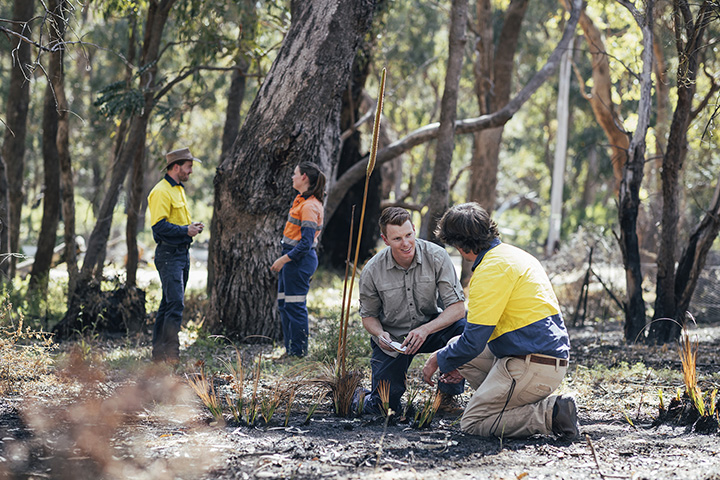- Go to homepage
- Specialty Schools
- National Centre for Emergency Management Studies
National Centre for Emergency Management Studies

The National Centre for Emergency Management Studies (NCEMS) plays an important role in training and preparing you to handle a range of emergency situations.
At the NCEMS, you’ll gain the skills and knowledge needed to respond to a range of crises. These include natural disasters like floods, bushfires and storms, as well as other emergencies such as biosecurity threats and pandemics.
Our comprehensive training programs incorporate the four key phases of emergency management: prevention, preparedness, response, and recovery, ensuring that you’re well-equipped to manage and mitigate risks effectively.
To learn more, contact a member of our team on (02) 7920 8831 or email us.
Tailored training
At the NCEMS, we offer a variety of professional development programs and accredited courses focused on crisis management and public safety.
These are designed to meet your specific needs, and include:
- group enrolments with tailored programs, and
- practical training led by experienced instructors.
Our courses are scheduled at varying times throughout the year. They are also able to be delivered on demand. The duration of the courses vary from 8 hours to 10 weeks.
To find out more information, please enquire about the course you’re interested in.
Course options
Manage the Public Information at an Incident
Statement of Attainment
Boost your role in an incident management team and gain the skills to distribute timely, targeted and tailored public information in a crisis. Enable others to make informed decisions and contribute to reducing the impacts of crises.
Australasian Inter-service Incident Management System (AIIMS)
Course
Prepare for emergency situations and acquire the skills to support your business or community. Gain the confidence to manage emergency incidents using the Australasian Inter-Service Incident Management System (AIIMS).
Exercise Management for Emergencies
Statement of Attainment
Learn the project management steps for designing, delivering and assessing the successes of a simulated scenario exercise. This training is essential for personnel responsible for community safety, training staff and ensuring service continuity.
Introduction to Emergency Management
Statement of Attainment
This course serves as an induction or refresher for those working in the sector. It focuses on applying emergency management concepts, principles and local arrangements to organisational policies and procedures.
Planning for complex incidents
Statement of Attainment
This course covers the roles and responsibilities of the Planning Section according to the Australasian Inter-Service Incident Management System (AIIMS). It's suitable for those working in all-hazards industries or those in emergency management.
Coordinate Emergency Planning
Statement of Attainment
Do you work with communities and the emergency management sector to plan for disasters? Planning is a key element of preparing for disasters and emergencies. This unit gives you with the skills required to undertake emergency planning.
Manage Recovery Functions and Services
Statement of Attainment
Develop the skills to effectively manage a range of recovery functions and services in the aftermath of emergencies. Cover areas such as financial assistance, personal support programs, health services, rebuilding programs and business continuity.
Prepare High-Level Written Communication
Statement of Attainment
Learn to write business cases, grant applications, policies, media releases and ministerial responses. Develop expertise in key operational documentation critical for emergency management organisations and support roles during crises.
Volunteers
Volunteers are essential to emergency service organisations, providing critical support during crises.
However, Australia is facing a decline in volunteer numbers due to:
- increased work demands
- changing personal priorities
- the effects of cultural globalisation.
These factors have impacted the amount of time that people have available to dedicate to volunteer activities.
In response to this, the NCEMS offers flexible and accessible emergency management training. This includes a range of non-accredited courses for volunteers.

Helping regional communities
Towns in regional NSW face unique challenges that make them more vulnerable to emergencies. This puts strain on local economies, impacting businesses and livelihoods.
By studying emergency management at the NCEMS, you can be better equipped to support your community during a time of crisis.
Our training equips you with the skills to:
- respond effectively to crises
- aid recovery efforts
- help protect the economic and social wellbeing of regional towns.

The environment
As technology transforms education and business, environmental sustainability must also be a priority in emergency management.
At the NCEMS, we incorporate an environmental strategy into our programs, which focuses on:
- meeting stakeholder needs while preserving natural resources for future generations, and
- addressing immediate crises alongside long-term environmental health.
Our approach ensures that emergency management practices support both current and future needs. By balancing emergency responses with sustainability, we prepare you to manage emergencies in an environmentally responsible way.

Frequently asked questions
Crisis Management: While this term is used differently across various industries, it generally refers to managing disruptions in technology and communication services. For example, an IT department might form a crisis management team to handle issues like an offline intranet or payroll system.
Emergency Management: Involves coordinating responses to natural or man-made disasters that affect a community, industry or area. It includes actions to preserve life and protect property from threats like fires, floods, biosecurity issues, terrorist attacks, pandemics and plagues.
Incident Management: This focuses on specific tasks and activities carried out by emergency personnel to address the immediate needs of communities during a disaster or crisis.
We offer three learning pathways for students:
1. Emergency Services: This pathway provides training in the Australasian Inter-Service Incident Management System (AIIMS). This pathway also offers training in specialised programs related to roles in public information, operations, planning, logistics and control. Additionally, courses such as Inter-Agency Liaison Officer and Exercise Management for Emergencies will help support the way we work with others during times of crises.
2. Business Organisations: These programs focus on essential skills for business continuity planning, political awareness and high-level written communication during major disruptions and emergencies.
3. Support Staff: This pathway is for those assisting emergency services personnel without formal qualifications. Our Basic Wildfire Awareness course helps ensure safety when caring for vulnerable animals and people during disasters.
The NCEMS offers training in various formats. This includes:
- in-person
- online through connected learning
- a combination of both.
Training can take place at over 130 TAFE NSW locations or be delivered through connected learning.
To find out how we can customise a solution for your organisation, please contact our team on at NCEMS@tafensw.edu.au
Teachers at the NCEMS are recruited from the public safety sector.
Learners will receive up-to-date information and experiences from professionals in their field.
As TAFE NSW employees, they meet the high standards set by ASQA and the NSW Department of Education.
All teachers hold at least a Certificate IV in Training and Assessment (TAE) and have industry-specific qualifications.
Yes, our team can tailor training solutions to meet organisational needs. This includes in-person training, online training or training delivered through a blend of both.
To find out how we can customise a solution for your organisation, please contact our team at ncems@tafensw.edu.au.
Become a volunteer
Volunteers are the backbone of emergency management services.
If you would like to consider becoming a volunteer, contact:
Disaster Relief Australia volunteers
For more information on our courses, or if you have any questions, please get in touch via email or call us on (02) 7920 8831.